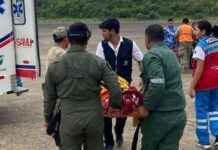“It’s not a bluff”, insisted, with a serious face, Mr. Putin, accusing Western countries of wanting to “destroy” Russia, of resorting to “nuclear blackmail” against it and thus signifying that it was ready to use nuclear weapons.
Faced with lightning counter-offensives by kyiv forces which have pushed back the Russian army, Mr. Putin has chosen to bet on an escalation of the conflict, with a measure which opens the way for the influx of Russian soldiers into Ukraine.
After the announcement on Tuesday of the organization of annexation “referendums” in four regions of eastern and southern Ukraine from Friday, the measure taken by the Russian president marks a turning point in the conflict.
“I consider it necessary to support the (Ministry of Defense) proposal for the partial mobilization of citizens in reserve, those who have already served (…) and who have relevant experience,” Putin said in a speech. recorded television broadcast Wednesday morning.
“We are only talking about partial mobilization,” insisted the Russian president, while rumors of a general mobilization aroused the concern of many Russians.
Russian Defense Minister Sergei Shoigu said that 300,000 reservists were affected by this mobilization order, barely “1.1% of mobilizable resources”.
This order is effective from Wednesday, said the Russian president. The corresponding decree was published soon after on the Kremlin website.
The American ambassador in kyiv considered that this measure was a “sign of weakness” of Russia, faced with a shortage of personnel to carry out its offensive in Ukraine, which enters its eighth month this week.
Mr. Putin once again attacked the West with virulence, accusing it of having “overstepped all limits in its aggressive policy” and of wanting “to weaken, divide and, ultimately, destroy our country”.
“Nuclear blackmail is also used (…) I would like to remind those who make such statements that our country also has various means of destruction, some of which are more modern than those of the NATO countries”, has said the Russian president.
“We will certainly use all the means at our disposal to protect Russia and our people,” he continued. “I say all the means (…) It’s not a bluff”, he insisted.
His Minister of Defence, Mr. Choigou, told him that Russia was not fighting “so much Ukraine as the West”.
The announcement of referendums in the areas under Russian control and the announcement of a partial mobilization mark a turning point in the Russian offensive in Ukraine, which began on February 24.
Especially since Russian military doctrine provides for the possibility of resorting to nuclear strikes if territories considered Russian by Moscow are attacked.
Many observers believe that Moscow has underestimated the capacities of resistance of the Ukrainians, motivated and armed by the West.
Mr Putin’s speech comes after the Russian army suffered setbacks in the face of Ukrainian counter-offensives in the regions of Kherson (south) and Kharkiv (north-east), where Moscow forces were forced to give up a lot of ground.
Mr Shoigu said on Wednesday that the Russian army had lost 5,937 soldiers since the start of the offensive, an official toll well above the previous one, but well below Ukrainian and Western estimates which report tens of thousands of losses.
– “Pseudo-referendums” of annexation –
On the ground, fighting and bombing continued on Wednesday, with Ukrainian authorities accusing Russia of having again bombed the site of the Zaporizhia power plant (southern Ukraine), the largest in Europe.
On the eve of Mr. Putin’s announcements, the authorities of the separatist zones or under occupation in Ukraine had announced “referendums” of annexation by Russia from September 23 to 27.
These elections will take place in the Donetsk and Lugansk regions, which form the Donbass (east), as well as in the occupied areas of Kherson and Zaporizhia, in the south.
These votes were immediately criticized by Ukraine, its president Volodymyr Zelensky minimizing the importance of these “pseudo-referendums”.
Westerners have also criticized them, with Berlin calling them “fictional” and Washington calling them “sham” elections.
These votes, on the model of the one which formalized the annexation of the Crimean peninsula (south) by Russia in 2014, denounced by kyiv and the West, have been the subject of preparations for several months.
The timetable seems to have accelerated with the Ukrainian counter-offensive. Russian officials had previously mentioned the date of November 4, the day of Russian national unity.








